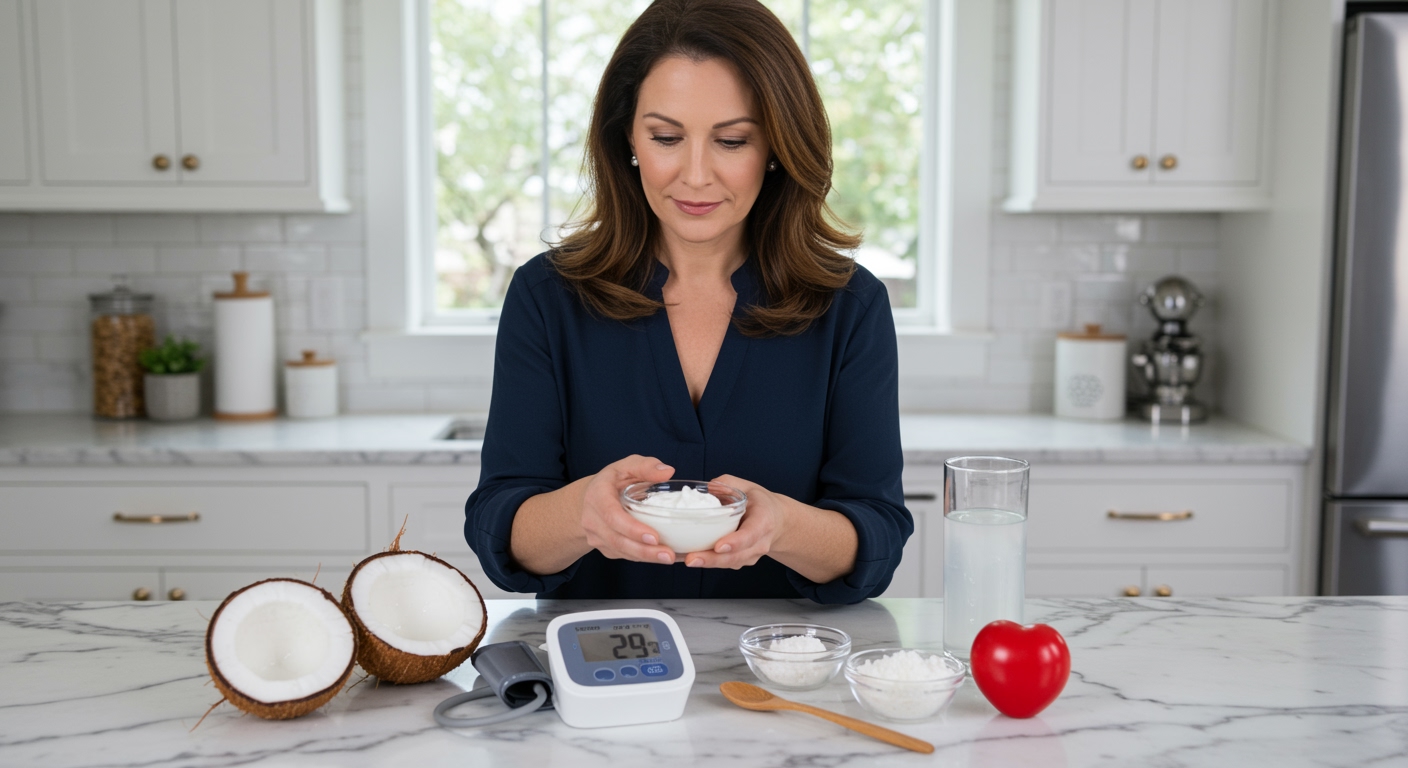✪ Key Takeaway: Coconut cream may help lower blood pressure due to potassium content, but its high saturated fat could counteract benefits.
Introduction
Your morning smoothie contains coconut cream, and suddenly you wonder if this creamy ingredient affects your blood pressure.
You might be asking this question because you have been told to watch your blood pressure, or perhaps your doctor mentioned being careful with saturated fats.
Hi, I am Abdur, your nutrition coach, and today I am going to explain exactly how coconut cream affects your blood pressure and what you need to know about this popular ingredient.
What Makes Coconut Cream Different From Other Creams?
Coconut cream comes from the thick white flesh of mature coconuts, not from dairy sources like regular cream.
This plant-based cream contains about 24 grams of saturated fat per 100 grams, which is significantly higher than most dairy creams.
The medium-chain triglycerides in coconut cream behave differently in your body compared to long-chain fats found in animal products.
Coconut cream also provides potassium and magnesium, two minerals that play important roles in blood pressure regulation.
Your body processes these nutrients through different pathways than it does with dairy cream, which affects how they influence your cardiovascular system.
✪ Fact: One cup of coconut cream contains about 630 milligrams of potassium, roughly 13% of your daily needs.
How Does Potassium In Coconut Cream Help Blood Pressure?
Potassium works as a natural blood pressure reducer by helping your kidneys remove excess sodium from your bloodstream.
When you consume coconut cream, the potassium enters your bloodstream and signals your kidneys to increase sodium excretion through urine.
This process reduces the total volume of fluid in your blood vessels, which decreases pressure against arterial walls.
The magnesium in coconut cream supports this process by helping your blood vessels relax and widen, further reducing pressure.
Research shows that people who consume adequate potassium typically have lower blood pressure readings than those with insufficient intake.
However, the amount of coconut cream you would need to consume for significant potassium benefits might also provide excessive calories and saturated fat.
✪ Pro Tip: Combine small amounts of coconut cream with potassium-rich foods like bananas or spinach for better blood pressure support.
Can Saturated Fat In Coconut Cream Raise Blood Pressure?
The high saturated fat content in coconut cream creates a complex relationship with blood pressure that researchers continue to study.
Traditional nutrition science suggests that saturated fats can increase inflammation in blood vessels, potentially raising blood pressure over time.
However, the medium-chain triglycerides in coconut cream may behave differently than the long-chain saturated fats found in red meat and dairy products.
Some studies indicate that coconut-derived saturated fats might have neutral or even beneficial effects on cardiovascular health compared to other saturated fat sources.
The key concern lies in total caloric intake and overall dietary patterns rather than coconut cream consumption alone.
If you consume coconut cream as part of a diet high in processed foods and excess calories, the combined effect could contribute to elevated blood pressure.
✪ Note: Individual responses to saturated fat vary significantly based on genetics, overall health, and lifestyle factors.
What Amount Of Coconut Cream Is Safe For Blood Pressure?
Most nutrition experts recommend limiting coconut cream to 1-2 tablespoons per day if you are concerned about blood pressure.
This amount provides some beneficial nutrients without overwhelming your system with excessive saturated fat or calories.
People with existing high blood pressure should be particularly cautious about portion sizes and frequency of consumption.
The timing of consumption also matters – using coconut cream in balanced meals with vegetables and lean proteins creates a more favorable metabolic response.
Your individual tolerance depends on factors like body weight, activity level, and overall dietary quality.
If you notice blood pressure changes after adding coconut cream to your diet, consider reducing the amount or consulting with a healthcare provider.
✪ Pro Tip: Track your blood pressure readings for two weeks when introducing coconut cream to identify any personal patterns.
Should You Choose Coconut Cream Over Other Options?
The choice between coconut cream and alternatives depends on your specific health goals and blood pressure management needs.
For people with normal blood pressure, moderate coconut cream consumption as part of a balanced diet is unlikely to cause problems.
Those with high blood pressure might benefit more from lower-fat alternatives like coconut milk or small amounts of coconut water.
The potassium content in coconut cream can be beneficial, but you can obtain similar minerals from foods with less saturated fat.
Consider your entire dietary pattern rather than focusing solely on one ingredient when making decisions about blood pressure management.
If you enjoy coconut cream, use it strategically in small amounts while maintaining an overall heart-healthy eating pattern.
✪ Fact: Light coconut milk contains about 75% less saturated fat than coconut cream while providing similar flavor benefits.
The Bottom Line
Coconut cream contains both beneficial and potentially concerning compounds for blood pressure management, making moderation the key to safe consumption.
The best approach to nutrition is balance, not elimination – this principle applies perfectly to coconut cream and blood pressure concerns.
I would love to hear about your experiences with coconut cream or any questions you have about managing blood pressure through dietary choices in the comments below.
References
At NutritionCrown, we use quality and credible sources to ensure our content is accurate and trustworthy. Below are the sources referenced in creating this article:





